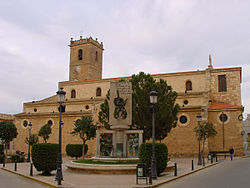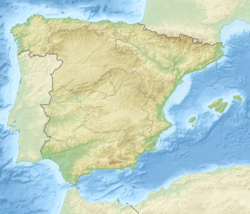
Murcia is a city in south-eastern Spain, the capital and most populous city of the autonomous community of the Region of Murcia, and the seventh largest city in the country. It has a population of 460,349 inhabitants in 2021. The total population of the metropolitan area is 672,773 in 2020, covering an urban area of 1,230.9 km2. It is located on the Segura River, in the southeast of the Iberian Peninsula. It has a climate with hot summers, mild winters, and relatively low precipitation.

Castilla–La Mancha, or Castile La Mancha, is an autonomous community of Spain. Comprising the provinces of Albacete, Ciudad Real, Cuenca, Guadalajara and Toledo, it was created in 1982. The government headquarters are in Toledo.

Cuenca is a city and municipality of Spain located in the autonomous community of Castilla–La Mancha. It is the capital of the province of Cuenca.

Azogues is the capital of Azogues Canton and of Cañar Province in Ecuador.
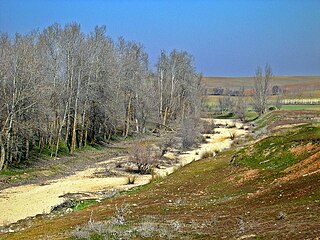
The Trabancos is a river in Spain that flows between the Zapardiel and the Guareña rivers, and is a tributary of the Duero river. The source of the Trabancos is in Moraña, a region in the north of the province of Ávila, near Blascomillán. The Trabancos is at an elevation of approximately 1,100 metres (3,600 ft), is approximately 85 kilometres (53 mi) long and, although its river bed is stable, only has a constant water flow during and immediately after torrential rains.

Villarrobledo is a Spanish city and municipality in the province of Albacete, part of the autonomous community of Castile-La Mancha. It's better known for having the world's largest area covered by vineyards as well as the world's greatest production of La Mancha wine, called in Spanish Denominación de Origen. Also, it is an important center of Manchego cheese production and export and has other important industries like metallurgy and transportation.

Barchín del Hoyo is a municipality in Cuenca, Castile-La Mancha, Spain. It has a population of 123. The town was the subject of the song "Little Spanish Town," released by English musician Conor B in 2012.
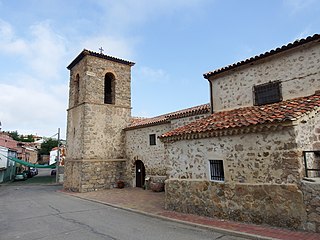
Beamud is a municipality located in the province of Cuenca, Castile-La Mancha, Spain. It has a population of 48 (2014).

Buendía is a municipality in Cuenca, Castile-La Mancha, Spain. It has a population of 505.
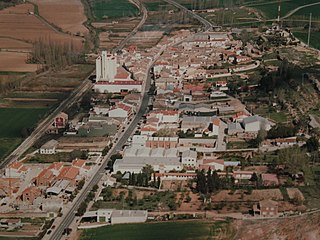
Chillarón de Cuenca is a municipality in located in the province of Cuenca, Castile-La Mancha, Spain. It has a population of 580 (2014).
Huete is a municipality in Cuenca, Castile-La Mancha, Spain. It has a population of 2,097. HUETE (Huepte), town in Castile, central Spain, situated between Cuenca and Guadalajara. There was a prosperous Jewish community there during the 13th century. In 1307 Ferdinand IV confirmed that the queen mother and other dignitaries could continue to receive the revenues they derived from the Jewish quarter of Huete. The Jews of Huete were attacked in 1391, but we have no information about the extent of the losses and damages the Jews there suffered. From that time, however, there was a *Converso group in Huete. The communal tax regulations, established in 1437 by John II, were confirmed in 1476 by Ferdinand and Isabella, who also ratified the Huete community's charter of privileges. In the second half of the 15th century there were in Huete 150 Jewish families, numbering about 750 Jews. When the decree of expulsion of the Jews from Spain was issued in March 1492, the Jews of Huete demonstrated and claimed that they had been given four years to leave the kingdom. Ferdinand and Isabella ordered that measures should be taken to punish them.

Mota del Cuervo is a municipality of Spain located in the province of Cuenca, Castilla–La Mancha. The municipality spans across a total area of 176.19 km2 and, as of 1 January 2020, it has a registered population of 6,055.

Luis Simarro Lacabra was a Spanish neurologist who was born in Rome while his parents were living in Italy.

Sotorribas is a municipality of Spain located in the province of Cuenca, Castilla–La Mancha. As of 1 January 2020, it has a registered population of 700. The municipality spans across a total area of 149.21 km2.

Uclés is a municipality of Spain located in the province of Cuenca, Castilla–La Mancha. The municipality spans across a total area of 64.61 km2 and, as of 1 January 2020, it has a registered population of 212.
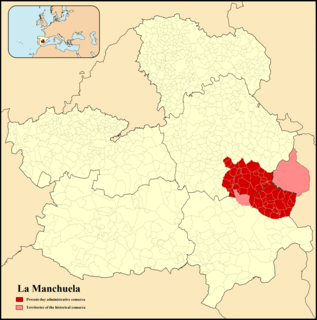
Manchuela or La Manchuela is a comarca located in Castile-La Mancha and Valencian Community, Spain.

San Clemente is a municipality in Cuenca, Castile-La Mancha, Spain. The municipality covers an area of 277.51 square kilometres (107.15 sq mi) and as of 2011 had a population of 7367 people.
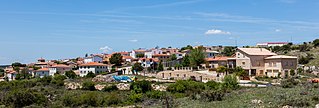
Carrascosa is a village in Cuenca, Castile-La Mancha, Spain. The municipality covers an area of 71.47 square kilometres (27.59 sq mi) and as of 2011 had a population of 117 people.

Guarenas-Guatire conurbation or Guarenas-Guatire metropolitan area , also known as El Nuevo Este de Caracas, is a conurbation area in Miranda, Venezuela, that includes 2 municipalities, it is part of the Greater Caracas Area. It has a population of 473,728 inhabitants.

Alarcón is a municipality in the province of Cuenca, in the autonomous community of Castilla-La Mancha, Spain.
